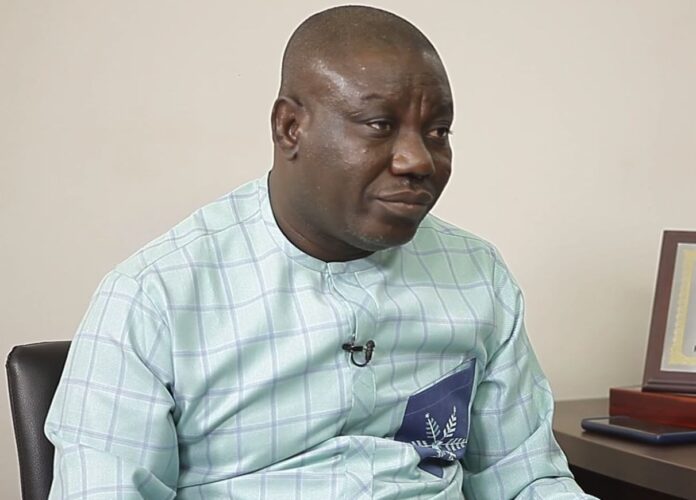
The Member of Parliament for Bolgatanga Central Isaac Adongo has described the Electronic Transacation Levy (E-Levy) announced in the 2022 budget as a monster.
According to him, the 1.75% E-Levy if allowed to stand will compound the hardship in the country.
Speaking during the debate of the 2022 budget statement and economic policy on the floor of parliament, the deputy ranking member for the finance committee rallied his colleagues to reject the levy given the negative impact it will have on individuals, families and businesses.
“E-Levy Mr. Speaker no matter how you call that thing it’s a monster. It doesn’t matter the language that you use, it’s a killer Mr. speaker that will change the face of our families and our children and the entire business community if we allow this to pass. This is anti-poor, this is anti-business, it is the most regressive. Mr. Speaker our role here is not to kill the hen that lays the golden egg and that hen is the businessman we are taxing to death.”
Mr. Adongo however declared the minority MPs are nationalistic enough to support government in raising revenue for development. He however insisted the revenue mobilisation measures announced in the budget are not in tune with the current prevailing economic situation in the country.
“Mr. Speaker I want to assure my colleagues on the other side that we’re very nationalistic and we seek to protect and develop our country. But we’ll not do so at the expense of the comfort and the wellbeing of our citizens. And that when you come here with budget proposals that seek to break the back of Ghanaians, we must stop you. When you arrive with an intention to impose a tax that will kill our people, we must kill the tax before it kills us.”.
The Bolgatanga Central MP further pointed out government’s policy incoherence over the years. According to Adongo, the business community especially importers have had a short end of the stick when it comes to policies of the Nana Addo administration. Citing the reversal of reduction in the benchmark values of over 40 selected imported items, Adongo asserted government cannot be trusted to protect the interest of the general public.
“Mr. Speaker we cannot trust this government. When this government came and said that they were moving from taxation to production and said that they had abolished special import duty, Abossey Okai people rose and jubilated not knowing they were waiting for them at the port to show them the difference. And when they arrived at the ports Mr. Speaker people must understand what’s benchmark values. Benchmark values are the exceptions and not the rule. What you do is that when we’re commissioner is suspicious that a particular invoice has been under invoiced then he has the mandate to use his own valuation to determine the appropriate rate. After you removed that import duty of 1% you went to the port and you gave all the items a new valuation so now they go and pay and they realise that they’re paying 3-4% more than when you had the 1% there. Mr. Speaker when you remove taxes, we suffer at the ports.”
“Mr. Speaker when these people came and said Adwumapa budget we ended up with excalated unemployment. Mr. Speaker when these people came and said the year of roads we ended up being insulted that educated people shouldn’t go on demonstrations. Our roads were not fixed.” He added.
Information Minister Kojo Oppong Nkrumah during his debate stated the revenue generation measures in the budget are geared towards job creation through policies such as ‘YouStart’ where an amount of Ghc 1 billion will be set aside to empower young enterpreneurs. The move according to government is to address the scalating youth unemploment situation in the country.
But Isaac Adongo is not enthused. According to him the program will do very little to address the joblessness in the country.
“Mr. Speaker today they are saying that they want to do YouStart with Ghc1 billion Ghana cedis. Mr. Speaker if you use Ghc1 billion cedis to create jobs of 1 million. That’s Ghc1,000 per head. So it’s because of Ghc1,000 our kids are unemployed.”
Government is seeking to spend an amount GH¢137.5 billion for the 2022 fiscal year.
The amount, which is 27.4 per cent of Gross Domestic Product (GDP), represents an increase of 23.2 per cent over the 2021 projected outturn of GH¢111.6 billion. Out of the amount, compensation for employees is projected at GH¢35.84 billion, goods and services are also projected at GH¢9.14 billion, with interest payments projected at GH¢37.44 billion. Capital Expenditure (CAPEX) is projected at GH¢16.39 billion, with other expenditure, mainly comprising Energy Sector Levies (ESL) transfers, payments to Independent Power Producers (IPPs) and financial sector costs (GAT capitalisation) also estimated at GH¢9.96 billion.

